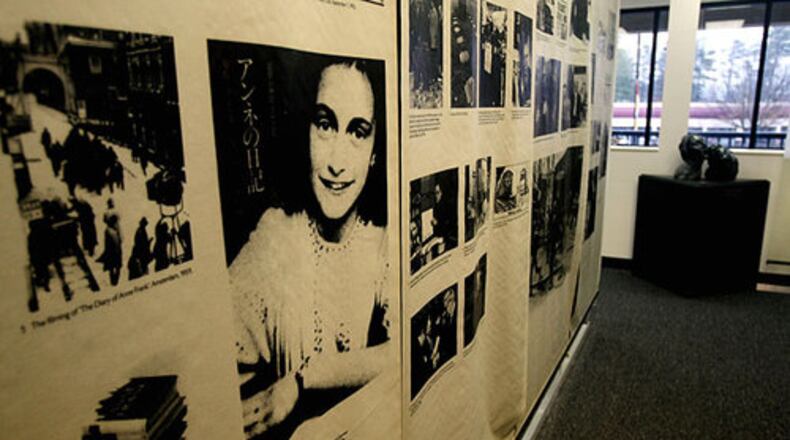Sandy Springs will consider other locations for a Holocaust memorial after residents opposed plans for the city to build a new $3.3 million cultural arts center to house it.
The Georgia Commission on the Holocaust and Sandy Springs officials are discussing a deal in which the commission would rent a portion of the cultural arts center building for $150,000 annually for 40 years. Sandy Springs would pay for construction of the center with $2.4 million from the city budget and would own the building.
The planned 8,300-square-foot cultural arts center would be located near the Performing Arts Center at the City Springs campus. The Commission, a state agency that educates the public on the mass killing of Jews by Nazi Germany, would occupy about 6,600 square feet and the city would present rotating exhibits or host events in the remaining space.
But numerous Sandy Springs residents say they don’t support city plans. Mayor Rusty Paul and City Council members heard from them during public comment at a Tuesday meeting. Through email, virtually or in person at City Hall, many spoke of the importance of Holocaust memorials but questioned the officials’ need to invest in new exhibits in Sandy Springs. Residents pointed to The Museum of History and Holocaust Education at Kennesaw State University and The Breman Museum in Atlanta as established places nearby that offer education about the Holocaust.
“…I believe the money would be better spent on a system of trails, athletic fields, sidewalks and outdoor facilities that will enhance our lives,” said resident Faith Greenstein, who commented in person.
Greenstein said she’s the granddaughter of a Holocaust survivor and suggested the Georgia Commission on the Holocaust focus on memorials at the other locations.
“This does not sound like a reasonable financial deal,” Duffy Hickey said in an email read by city staff.
In an email to The Atlanta Journal-Constitution, city spokeswoman Sharon Kraun said based on community feedback, an architect will review other locations and that assessment will be provided at a future City Council meeting.
Other existing buildings have been suggested as a location for a city culture arts center, including the Blue Stone Road building that was home to the former Heritage Sandy Springs nonprofit or the Williams-Payne House Museum.
Sandy Springs residents who oppose the city’s construction of a new cultural arts center are unaware of the scale of the planned Holocaust exhibits or that the Georgia Commission on the Holocaust has raised more than $3 million for the space, a representative of the state agency said.
“We are planning seven exclusive world class exhibits and they deserve to be on the City Springs campus site, Commission member Chuck Berk told The Atlanta Journal-Constitution on Wednesday.
The Anne Frank House in Amsterdam is helping the Commission to create exhibits, including one that would reproduce the 540-square-foot space where Anne Frank and seven other Jewish people hid for 761 days during the Nazi occupation of the Netherlands, Berk said. A high-tech interactive exhibit created by the USC Shoah Foundation and titled “Dimension in Testimony” will allow visitors standing in front of a video screen to ask questions related to a Holocaust experience and a survivor will appear on the video with an answer.
The Anne Frank in the World exhibit and the commission offices are currently located at the Parkside shopping center in Sandy Springs. The exhibit has been closed since the pandemic started in March 2020. Before then the commission regularly partnered with other organizations to bring exhibits to Sandy Springs and other cities throughout the state.
The commission also has traveling exhibits available for loan to schools and Georgia communities. One of the traveling exhibits is titled Witness to the Holocaust: WWII Veteran William Alexander Scott III at Buchenwald. Scott, who was Black, witnessed liberation of the the infamous death camp. The exhibit parallels Jim Crow laws in the U.S. with the Nuremberg race laws in Germany and other parts of Europe.
Some residents were critical of the proposed 40-year agreement with the Commission, but Berk said the time period is assurance for major investors that the city can’t evict the agency from the space. The commission is working to raise another $5 million to fund exhibits, he said.
“If I were to bring those people (Sandy Springs residents) in front of me and give them a thorough understanding what this is all about, I think they would be much more informed,” Berk said.
The arts center would present stories on a range of cultures and race, Berk added. “You don’t just want to tell people what happened (during the Holocaust),” he said. “You want Sandy Springs to tell people what we’re about. We are a city that stands up for racial justice and equality.”
Earlier in April, City Council members weren’t all in agreement on plans for the new center. Councilman Tibby DeJulio questioned the financial cost and wisdom of constructing a new building when Sandy Springs has space available elsewhere. And Councilwoman Jody Reichel doubted the city’s presentation of potential plans for the new center during that April 6 meeting were clear enough for residents to understand.
About the Author
Keep Reading
The Latest
Featured


